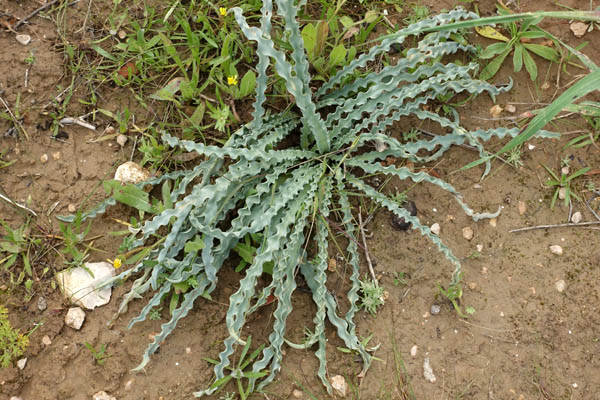Hebrew: חצב גלוני, Arabic: عنصل متموج
| Scientific name: | Urginea undulata (Desf.) Steinh. | |
| Synonym name: | Drimia undata Stearn. | |
| Common name: | Undulate Sea Squill, Undulated Sea Onion | |
| Hebrew name: | חצב גלוני | |
| Arabic name: | عنصل متموج | |
| Family: | Liliaceae, Lily family, שושניים |

|
| Life form: | Geophyte | |
| Stems: | 20-50 cm | |
| Leaves: | Basal rosette, linear-oblong, undulate-sinuate, appearing after flowers | |
| Inflorescence: | 8 to 30-flowered raceme | |
| Flowers: | Purple, greenish purple, Perianth-segments with a reddish mid-vein; style longer than stamens | |
| Fruits / pods: | Capsule three-sided, numerous seeds, flattened, winged | |
| Flowering Period: | August, September (stunning foliage in February) | |
| Habitat: | Shrub-steppes | |
| Distribution: | Mediterranean Woodlands and Shrublands, Shrub-steppes, Semi-steppe shrublands, Deserts | |
| Chorotype: | Saharo-Arabian | |
| Summer shedding: | Ephemeral |
|
Derivation of the botanical name: Urginea, named for an Arabian tribe in Algeria, known as Ben Urgin. undulata, waved, wavy. Drimia, Greek δριμύς, -εῖα, -ύ (adj). = acrid, pungent, referring to the bulbs which can irritate the skin. The Hebrew name Hatsov appears in the Mishnah, Kil'ayim ( prohibitions) A 8; chatsov, also hatsuva; Aramaic: hatsuva, חצובא. [In the Mishnah, Kil'ayim A 8, Section three: The sea squill is a bulbous plant whose roots grow deep. It seems that planting the young fig in the sea squill would help cool it by providing shade. However, this is kilayim and is therefore prohibited.]
|